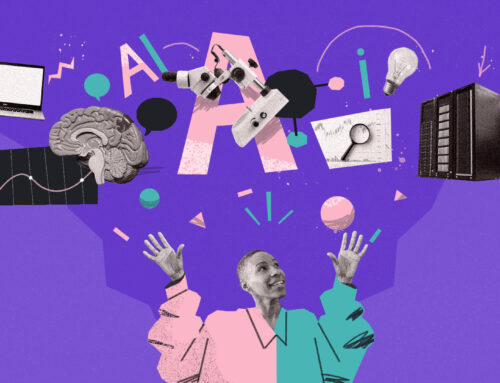In the era of digitization, where precision is paramount, healthcare providers seek intuitive solutions that promise data-driven care. AI plays a pivotal role in revolutionizing the medical sector and markets EHR solutions to encourage healthcare providers to deliver smart and efficient care.
It is a game-changer promoting the implementation of tech-driven EMR and EHR systems to make a difference. AI is helping healthcare providers connect with their target audience in smarter, more efficient, and personalized ways. And that’s one reason why they feel inclined towards implementing EHR solutions.
The Role of AI in EHR Systems in Modern Times
The role of artificial intelligence in EHR systems is transforming modern healthcare by improving efficiency, accuracy, and patient outcomes. AI in EHR leverages machine learning and AI algorithms to analyze vast amounts of health data, enhancing clinical decision support systems and optimizing healthcare delivery. The use of artificial intelligence in electronic health record systems enables automated documentation, predictive analytics, and personalized treatment plans. AI technology in healthcare is particularly valuable in improving health information technology and advancing health informatics, leading to better health outcomes. The application of AI in EHR data enhances population health management by identifying trends and risk factors across a health system. Additionally, AI applications support physicians in diagnosing and treating complex health conditions, streamlining workflows, and reducing administrative burdens. Epic is using AI to integrate AI functionality into its electronic health record systems, improving the accuracy of predictive models and optimizing patient care. The use of AI also enhances digital health by automating data processing and reducing errors in health information management. As healthcare IT news highlights, the AI system is driving innovation in AI in medicine, revolutionizing the way electronic health records support clinical decision-making. With the rise of generative AI, the use of artificial intelligence continues to evolve, ensuring that AI in health care remains a critical component of modern health information technology.
The Potential of AI in EHR Solutions
The global market of artificial intelligence in healthcare was valued at US$10.31 billion in 2023 and is expected to grow at a CAGR of 49.1%, reaching US$164.16 billion by 2030. AI is experiencing an unparalleled surge in its growth and acceptance in the healthcare field, and its integration with EHR solutions has far-reaching implications.
AI with big data enables healthcare professionals to utilize large-scale medical data from EMR records, improving care quality by supporting data-driven decision-making.
This technological advancement does more than just streamline administrative workflows. AI in healthcare can be used for:
- Health monitoring.
- Imaging.
- Clinical trial participation.
- Image analysis.
- Digital consultations.
- Illness detection.
- Diagnostics.
- Error reduction.
When integrated with EHR solutions, AI enhances the extravaganza of EHR system manifolds. Therapy Platform, the best EHR for mental health private practice, is an artistic example of this integration, saving lives with precision in care.
Implications of AI in EHR Solutions
Artificial intelligence has vast implications for the medical sector, and EHR vendors are no exception. AI helps classify patients at risk, improves physicians’ ability to make clinical decisions, and draws on the power of big data for health analysis.
These factors and many more boost EHR marketing as AI entices care professionals to make an invaluable investment in EHR solutions. Let’s uncover the prominent implications of AI in EMR systems that drive revenue by improving EHR marketing.
- Notes taking
AI-powered transcription tools fast-track the note-taking process, simplifying arduous documentation tasks and keeping providers focused on patients. By integrating with EMR platforms, AI has taken medical transcription to a whole new level, minimizing the errors that come with manual not-taking. This is one reason why doctors consider EHR solutions.
- Data analysis
Data analysis is the cornerstone of AI technology. AI assesses and evaluates healthcare trends. AI-powered tools analyze vast datasets to identify healthcare providers’ specific needs and pain points. By evaluating search trends, social media activity, and historical data, they create a comprehensive profile of the target audience, enabling more focused marketing strategies.
- Medical diagnosis
AI assists in diagnosis with a diagnostic rate of over 98%. Epic EHR, the best overall healthcare software, masters AI-backed patient data analysis to identify health patterns and make personalized suggestions. AI technology helps EHR systems effortlessly interpret health records, lab results, and medical imaging, ensuring precision in care delivery.
- Records management
By leveraging AI, medical professionals can enhance record management. When embedded in EMR systems like TherapyNotes, the best EMR for small therapy practice, AI works wonders, revolutionizing records management. It stores records securely, manages lab reports and imaging results, and streamlines tasks related to medical billing services, alleviating physicians’ burden
- Treatment personalization
With the aim of improving patient care, AI helps personalize treatment plans. This way, it portrays to practitioners that their clients matter, and their satisfaction is the top priority of EHR solutions. EHRs feature AI-driven custom templates to assist doctors in delivering optimal care services by evaluating patient history and symptoms, ensuring personalized treatment.
All these elements add value to the EMR market, as EHR providers can boast about the countless benefits of AI-powered healthcare services that help clinicians prosper—similar to how Electronic Invoices Templates streamline and enhance efficiency in managing financial workflows.
Role of AI in Strategic EMR Marketing
The essence of AI goes beyond EHR integration. EHR service providers can leverage AI to market their solutions. Let’s explore different ways AI helps market EMR and EHR solutions to practitioners.
- Targeted Audience Segmentation:
AI analyzes demographic, behavioral, and psychographic data to identify specific healthcare provider segments for tailored campaigns. - Predictive Analytics:
Leveraging historical and real-time data to forecast market trends, AI helps healthcare technology providers prioritize high-potential opportunities. - Personalized Marketing Campaigns:
AI creates customized messaging based on the unique needs of solo practices, small clinics, or large hospitals. - Optimized Content Creation:
AI tools generate SEO-friendly blog posts and content, using relevant keywords like “best EMR for small practices” or “cost-effective EMR systems” to attract clients. - Hyper-Targeted Advertising:
Artificial intelligence refines digital ad targeting, ensuring EHR campaigns reach the target audience optimally, boosting click-through and conversion rates. - AI-Driven Chatbots:
AI chatbots on EHR platforms provide responsive, 24/7 support to answer queries about EMR features, integrations, and pricing, improving providers’ engagement. - Social Media Insights:
AI monitors healthcare-related social trends and sentiment, enabling marketers to align campaigns with current conversations. - Lead Scoring and Qualification:
AI ranks leads based on their likelihood to convert, allowing sales teams to focus on high-value prospects. - Marketing Automation:
Automates tasks like email follow-ups, campaign scheduling, and A/B testing, ensuring efficiency and consistency. - Performance Analytics and ROI Tracking:
Provides actionable insights into campaign effectiveness, enabling continuous optimization to achieve higher ROI. - Dynamic Pricing Strategies:
AI helps EHR providers adjust pricing models in real-time, catering to market demands and ensuring competitiveness in EMR offerings. - Customer Retention Analytics:
Tracks user engagement post-sale, providing data-driven strategies for upselling or renewing EMR contracts.
This is how incorporating AI into strategic EMR marketing enables EMR service providers to stay ahead in a competitive EMR market.
Conclusion
Undoubtedly, AI is the core of the healthcare arena, with its roots embedded deep within EHR solutions. It is a game-changer, transforming care norms by revolutionizing EHR tools. From notetaking to medical diagnosis and data analysis, it adds value to all processes.
It is now imperative for healthcare providers to use AI in clinical decision-making in order to deliver data-driven clinical services that enhance patient satisfaction within the healthcare industry. This is what AI tech targets to market EMR and EHR solutions, as well as the needs and requirements of practitioners.
As for EHR services, providers, by adopting AI-driven marketing solutions, can better communicate the value of their EMR offerings, ultimately improving the adoption rate of their transformative solutions in the care realm.
AI ensures precise, efficient, and impactful care; that’s how it markets EHR solutions.
Frequently Asked Questions (FAQs)
1. How is artificial intelligence in medicine improving the healthcare system?
The healthcare system is evolving rapidly with artificial intelligence in medicine, enhancing efficiency and patient care. Using artificial intelligence, health organizations can analyze vast amounts of healthcare data, improving diagnosis and treatment plans. The integration of AI into complex EHR systems helps health care providers streamline workflows and optimize decision-making.
2. How does AI improve clinical decision-making in healthcare?
AI models are using clinical decision support tools to enhance the accuracy of diagnoses and treatments. AI to improve healthcare leverages predictive analytics and real-time insights from electronic medical records, enabling health care providers to make informed choices. The accuracy of AI in analyzing health symptoms and predicting potential risks contributes to better patient care and safety.
3. How is AI used to generate progress notes in EHR systems?
AI uses AI to generate progress reports and AI to generate progress notes by analyzing patient interactions and summarizing key details. This automation reduces administrative burdens, allowing healthcare providers and patients to focus on treatment. AI and ambient listening technology also enhance documentation by ensuring a more natural and detailed record-keeping process.
4. What role does responsible AI play in healthcare?
Responsible AI ensures ethical, unbiased, and transparent decision-making in healthcare. It prioritizes patient privacy and security while promoting trust in AI-driven technologies. By integrating AI into healthcare, organizations must comply with regulatory guidelines from entities such as the national coordinator for health information and the coordinator for health information technology to ensure patient safety and ethical AI usage.
5. How does AI support the integration of PGHD in EHR systems?
The use of PGHD in health (patient-generated health data) is becoming more common, and the integration of PGHD and EHR allows for more personalized treatment plans. AI processes large datasets efficiently, enhancing health information exchange and enabling a seamless integration into health care. AI-powered healthcare data gateways also facilitate secure and fast access to patient information.
6. How is AI involved in transforming healthcare by improving efficiency and outcomes?
AI can help transform health by optimizing workflows, predicting health trends, and assisting in early disease detection. AI to improve healthcare enhances diagnostics, while AI features such as natural language processing and AI and ambient listening improve medical documentation. The impact of AI in integration into health care systems is evident in its ability to support real-time decision-making and patient management.
7. What is the role of AI in the future of healthcare?
The future healthcare journal highlights the power of AI in revolutionizing patient care. AI-driven innovations, particularly generative AI, are shaping a new health system by automating administrative tasks and enhancing clinical decision-making. AI’s influence on health is profound, as it improves the understanding of the patient’s health and enhances overall health and quality of life.


